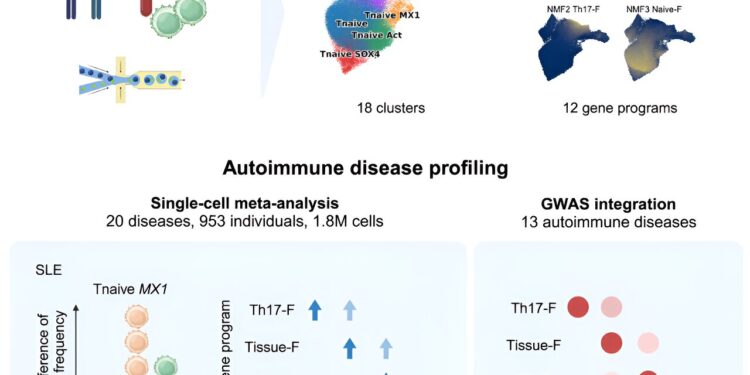Credit: Cellular genomics (2024). DOI: 10.1016/j.xgen.2023.100473
Just as ripples on the water can betray powerful currents beneath the surface, small changes in our bodies can sometimes be a sign of serious illness. Now, Japanese researchers say blood cells can provide telltale signs of significant immune dysfunction.
In a study recently published in Cellular genomicsResearchers from Osaka University have revealed that subtle changes in specific immune cell populations can signal the presence of an autoimmune disease.
In autoimmune diseases, which affect up to 5% of the population, the body’s immune cells attack the body instead of pathogens. A subset of immune cells called CD4+ T cells are known to play a key role in the onset and progression of many autoimmune diseases.
“CD4+ T cells may exist in a naive or memory state, may exhibit polarization toward a Th1, Th2, Th17, or Tfh phenotype, or may be regulatory T cells,” explains lead study author Yoshiaki Yasumizu. However, there is still a great deal of heterogeneity among cells in these categories, and the effect this has on autoimmune diseases remains largely unclear.
To address this problem, researchers used single-cell RNA sequencing and an analytical approach known as non-negative matrix factorization to analyze CD4 gene expression profiles.+ T cells in healthy individuals and patients with autoimmune diseases. This analysis identified 18 different types of CD4+ T cells and 12 distinct genetic programs, which were then used as a reference to analyze nearly 2 million CD4+ T cells from nearly 1,000 people with 20 different autoimmune diseases.
“The results were very interesting,” says lead author Shimon Sakaguchi. “We found that characteristic changes in CD4+ T cells defined by the 18 categories and 12 genetic programs were associated with specific autoimmune diseases, suggesting that these conditions have a detectable “signature.”
Additionally, researchers detected distinctive changes in CD4+ T cell categories and genetic programs linked to aging and sex, two factors known to influence the risk of developing an autoimmune disease. In addition, genetic factors favoring the development of the disease accumulated in CD4+ T cells with specific genetic programs.
“Our study presents a complete catalog of CD4+ The changes in T cells observed in 20 different autoimmune diseases provide an invaluable resource for researchers,” says Yasumizu.
In the future, this catalog could potentially be used to detect autoimmune diseases in patients by simply taking a blood sample and analyzing CD4.+ Characteristics of T cells, paving the way for precision medicine.
More information:
Yoshiaki Yasumizu et al, Single-cell transcriptome landscape of circulating CD4+ T cell populations in autoimmune diseases, Cellular genomics (2024). DOI: 10.1016/j.xgen.2023.100473
Provided by Osaka University
Quote: Small changes in specific immune cell populations linked to autoimmune diseases (January 11, 2024) retrieved January 11, 2024 from
This document is subject to copyright. Apart from fair use for private study or research purposes, no part may be reproduced without written permission. The content is provided for information only.



